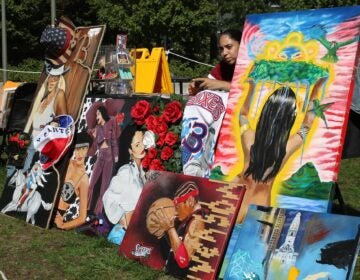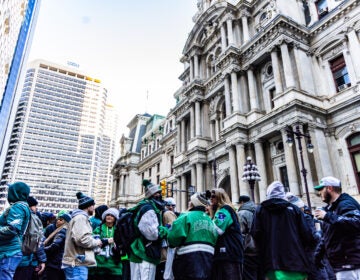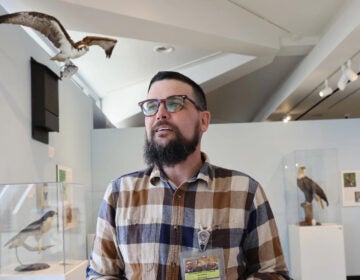Live on-stage documentaries hit Philly, including ‘karaoke rock opera’
ListenTwo filmmakers are showing Philadelphia new ways to make documentaries, by taking them to the stage in a hybrid of music performance, theater, and film.
New York-based filmmaker Sam Green was nominated in 2002 for an Academy Award for his documentary, “The Weather Underground,” about the violent political activism of the Weathermen in the 1960s. It had a limited theater run at the time, and is available on Netflix, Amazon, and YouTube.
His new project is not available anywhere online. “The Love Song of R. Buckminster Fuller,” about the visionary designer who spent most of the last 10 years of his life at the University of Pennsylvania, exists only as a live performance.
“Buckminster Fuller was an unlikely hero for the counter-culture,” said Green during his live narration of the film, setting up an old TV news clip of Fuller talking with hippies in San Francisco. His informal, soft-spoken vocal style is backed up by the band Yo La Tengo, which joins him onstage to perform an original score.
The film element of the performance is made up up of interview footage shot by Green with people who knew or studied Fuller, and visual artifacts from the Dymaxion Chronofile, a massive, life-long archive Fuller maintained about himself.
“He is a documentary filmmaker’s dream because he saved everything,” said Green. “Not only did he save laundry receipts and telegrapms and letters, he saved photgraphs of himself. Whenever somebody took a photo, he got a copy of it. When somebody filmed an interview with him, he got a copy of it.”
Not only is Fuller an ideal subject for a documentary filmmaker, he is an ideal subject for this filmmaker. Green’s previous experiment with performance documentary, “Utopia in Four Movements,” looked at the successes and failures of four attempts to build an ideal community. Buckminster Fuller’s ideas also sought a global utopia; he believed good design would preserve resources and promote sharing, leading to world peace.
Similarly, Green’s documentary film-as-performance format strives to create a moment of physical community in an otherwise dissociative online world.
“One of the things I love about this form is it requires a lot of care and energy. This may sound silly, but there’s a lot of love in it,” said Green. “We come all the way there, we’re all in a room together, you’re sitting with strangers, you paid some money for a ticket, you turn your cell phone off, the lights go down, you totally give yourself over to this experience. That makes things special.”
Green is not the only person experimenting with the live documentary format.
Brooklyn artist Rachel Mason will sing a documentary, accompaned by projected film and live music. On April 15th at the University fo the Arts on Broad Street, she will present the “The Lives of Hamilton Fish.”
One Hamilton Fish was a former Speaker of the New York State Assembly who served as assistant treasurer under President Teddy Roosevelt.
The other Fish — Albert “Hamilton” Fish — was a serial killer executed in Sing Sing prison.
“He kind of makes Jeffrey Dahmer look like child’s play,” said Mason, adding that was “poor choice of words, but he ate children.”
Curiously, both of these Hamilton Fish’s died on the same day, January 15, 1936, about 20 miles apart. The following day the Peekskill Evening Star News ran their obituaries together.
That bizarre coincidence prompted Mason to spend seven years writing a 20-song cycle imagining the ways their lives intersected — both real and fantastic. She shot a feature-length film as a kind of extended music video in which actors mouth the lyrics to her songs.
Last summer Mason debuted the performance and film at the the Pineapple Underground Film Festival in Hong Kong. For the Philadelphia show, the American premiere, she will be joined onstage by artist and musician Stephen Dufala, who will be accompanying her with a variety of instruments.
Mason says, ultimately, she would like the open up the performance to anybody, turning the project into a kind of karaoke rock opera.
“Anyone cam learn the songs. I like this idea of a karaoke film, as a structure,” said Mason.
The costumes and props Mason created by hand, many out of cardboard, are now on display at the Marginal Utility gallery at 319 N. 11th Street (aka the Vox building) in North Chinatown. The gallery had hosted an earlier iteration of this project.
WHYY is your source for fact-based, in-depth journalism and information. As a nonprofit organization, we rely on financial support from readers like you. Please give today.





